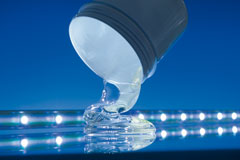Oct 13 2010
Experts from Bayer MaterialScience have developed raw materials for highly transparent two-component polyurethane casting compounds that can be used to manufacture lighting strips and other lighting elements with light-emitting diodes (LEDs). The LEDs are given effective and long-term protection against moisture, weathering and cleaning agents by being integrated into the elements.
The new casting compounds from Bayer MaterialScience meet a demand created by the current transformation in lighting technology. LEDs are becoming increasingly popular as they convert around 90 percent of the electrical energy fed in into light and have a service life averaging 50,000 hours. By way of comparison, a conventional light bulb uses only around ten percent and blows after an average of 2,000 hours. LEDs also open up a whole new range of creative options for furniture designers, interior designers and architects. They are compact and can be combined into programmable lighting elements that constantly change color.
 Bayer MaterialScience has developed raw materials for highly transparent two-component polyurethane casting compounds that can be used to manufacture lighting strips and other lighting elements with light-emitting diodes (LEDs). The LEDs are given effective and long-term protection against moisture, weathering and cleaning agents by being integrated into the elements.
Bayer MaterialScience has developed raw materials for highly transparent two-component polyurethane casting compounds that can be used to manufacture lighting strips and other lighting elements with light-emitting diodes (LEDs). The LEDs are given effective and long-term protection against moisture, weathering and cleaning agents by being integrated into the elements.
The casting compounds are formulated from solvent-free, aliphatic Desmodur® grades in combination with solvent-free Desmophen® grades. The two liquid components, which are combined without any air bubbles shortly before processing, are used to cast the LED strips required. The compound hardens to create a highly transparent casting that completely embeds the LEDs. The specific selection of the two components enables the consistency of the casting compound to be adjusted from highly flexible to very hard. This allows production of high-quality lighting elements for an extremely wide range of applications using a broad array of design options.
"Aliphatic polyisocyanates and polyols from the Desmodur® and Desmophen® ranges are established raw materials for brilliant and extremely resistant coatings. They are now also lending their excellent properties to molded parts," said Ulrich Meier-Westhues from the team of developers at Bayer MaterialScience. The molded parts are crystal clear, lightfast and highly resistant to chemicals and mechanical stress. Their properties can also be tailored to suit specific requirements thanks to the wide range of Desmodur® and Desmophen® grades available.
Dr. Meier-Westhues is convinced that "thanks to their water-repellent effect, casting compounds will also help LED strips make inroads in bathrooms, saunas, swimming pools, external facades and gardens in the future".